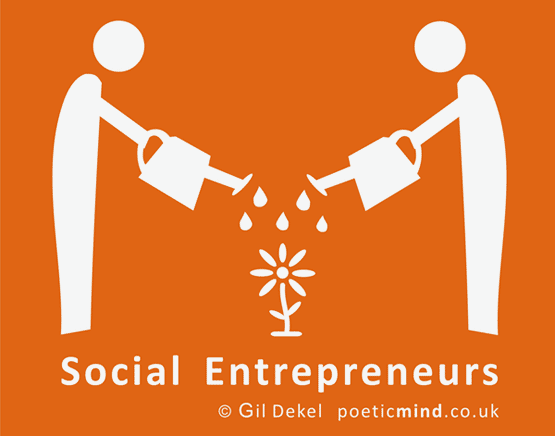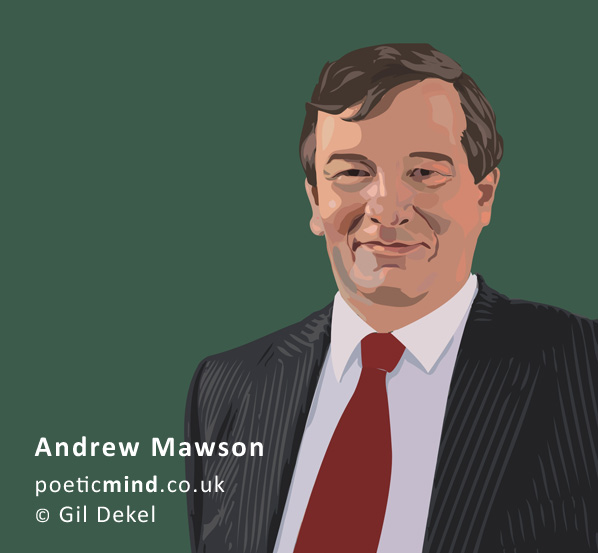
By Gil Dekel, PhD.
Summary of main insights from Andrew’s experience:
– Don’t take ‘no’ for an answer.
– Set an example. People will respect that, and gather around you.
– Question the consensus, and challenge policy makers.
– Fine words cannot replace practical actions.
– Governments should guarantee people that deliver results, instead of providing for organisations that do not deliver results.
Book summary:
Page 2
Social entrepreneurs do not start a project with policies, statistics or theory, but with passion, people in mind, experiences and personal stories.
Andrew quickly drew kindred spirits to help him in his project in London. People were impressed by his attempts and sincerity. When building a team, sincerity is more effective than placing an ad in the newspapers.
3
Many interest groups, including religious establishments, were talking about ‘making poverty history’ but they did not take the actual work or embraced a business logic which is necessary if you want to do anything in practicality.
Social entrepreneurs know how to demonstrate in practice what they are proposing to do. If you demonstrate it to people in small and tangible ways, then they can expand on the possibilities.
4
Start your business with inner dynamics, not with documents or committees. True innovations and progress in the public services do not come through governmental processes, but through people that are building strong relationships with people around them.
The chef Jamie Oliver did exactly that, inspiring people in their own environments. Jamie inspired kitchen staff in schools to get back in love with food, and to engage with the children and parents. In such way Jamie brought innovation to schools’ meals.
5
Become a change-maker without compromising human creativity. To do so you need to trust and back-up individuals, not structures.
6
Some commonly shared principles by social entrepreneurs:
– Learning by doing,
– Can-do approach to what seems at first a problem,
– Developing relations and inspiring people (not developing processes).
Governments tend to set up committees to assess a situation. They will commission people who know the theory behind things, but not the practicality. Such ‘experts’ will then examine the issue, write extensive reports, and promise a policy paper to follow up. They will not think of joining people, taking hold of the physical issue, getting the feeling of being stuck-in by doing and figuring out how to find solutions. They will not be part of the actions that are taken to get from theory to result.
7
Charitable organizations are driven by ideology, while businesses are driven by profit. Social entrepreneurs are not driven solely by financial profit or ideology, rather by wanting to make a mark on the world and share something important. They care about the people and about forming relationships, while forming a viable business venture.
8
Businesses operate in the real world – if you don’t sell your product, you go bust. Public and charitable sectors often do not have to operate in this real environment, since they are funded by grants. This is the ‘grant-dependency culture’.
10
Politicians, journalists and charity workers can produce many fine words but few practical solutions.
The present phase of social innovation has developed into a relationship between social entrepreneurs and business. The social (community) and the business are brought together by the social entrepreneurs.

‘Social Entrepreneurs’ by © Gil Dekel
11
You need to start by opening one high-street shop if you want to understand its inner working mechanism that will help you build up thousand shops. Governments, on the other hand, seem to think that you can build up thousand schools if you only have the correct policy, which they think should come before properly understanding the practical inner workings of just one school.
13
Become people-friendly, and turn passion into actions at your local area.
29-30
A dance teacher approached Andrew to hire a hall in his church for a dance school she wanted to open. Andrew suggested that instead of just renting the place to her, they would have a business-like agreement: they will work together to build up the school. In working together, she would get the school she wanted, and he will get a reliable rent cheque, as well as new relations with new people to build upon.
33
Andrew personally delivered 2,000 leaflets advertising a meeting he was organising. He ran up and down the neighbourhood distributing the leaflets in people’s mail boxes, but only three people came to the meeting… Success can be hard at first…
41
Sometimes people do not know what they actually want. In order for people to aspire and achieve they need imagination, daring and creativity.
43
While people should always remember their rights, they should also not forget their responsibilities. Motives can be very good but sometimes they may not produce results. Someone can hold the right; they can hold the values and the motives, but their actions may end up hurting them and others.
48
Artists, just like entrepreneurs are in touch with the world and know how to bring change about.
49
Real change does not come easily. It requires lifetime commitment, not governmental cycle of forms-and-meetings.
52
Community is not created by talking about it, but by actions carried out together.
54-55
Be open to possibilities. Encourage people rather than being suspicious of people. See potential for success, not failure.
58
For a project to succeed and get the support of government from start to end, you will need to find an individual within the government who will care enough to put the time and see the project coming through to fruition.
Andrew knows from his experience that without a representative that will take the charge over a project, the project will get stuck in governmental committees, where policies are debated but no one takes the responsibility to act.
61
Are grants truly fair when they are distributed among as many researchers as possible; or are they fair when they are given only to the best researchers and best scientists who actually deliver results?
Fairness is when we back-up success, and put trust in people that can demonstrate that they can deliver results.
62
What is more logical: to back-up those stones that move forward, or instead to make all stones more square just in case one stone tries to move forward faster?
70-71
Pay attention to details. When you pay attention to details, people will start to think about themselves differently.
71
Provide quality services and respect people. They will respond positively to you. A paper-cup coffee is not what respected cafés offer their clients. Offer people nice cups.
Many organizations receive grants from the government so they look up towards the government; they don’t look towards the people that they actually supposed to serve.
75
Sympathy and well-meaning words cannot replace actions and delivery of result.
77
The model ‘artist-entrepreneur’ can make a more profitable business than the model ‘policy-paper-researcher’.
90
People’s ill-health is strongly connected to apathy. Apathy towards people can affect their health. Therefore, there is a need to connect health, education, housing, environment, enterprise and art – into one centre.
97
Be bold, strong, vocal and clear about what you wish to achieve. Do not take ‘no’ as an answer. Some people will gather around you from unexpected places. Inspire people to aspire to be great.
101
Andrew collaborated with Tesco’s shop in his neighbourhood. He did not consider Tesco an alien or ‘commercial’ business that abuses the community. Rather he saw Tesco’s shop as an opportunity to develop the community, based on a business model that is good for Tesco and the community.
102
The environment and the design around us have major effect on our life. Therefore, go and visit unexpected places. Lift people’s expectations and aspirations.
106
Andrew did not manage to buy a property they were looking to buy in Allington. However, during that process they learned a lot about buying properties, and that helped them in later purchases.
Social enterprises operate on clear business principles, but with a social purpose. The point is that it has a viable business model. Social enterprise is enjoyed by business people, the public sector, the voluntary sector, as well as the general public. It has a sustainable business model that benefits all.
110-111
Andrew set up an integrated centre in Bromley-by-Bow where there is a GP, nurses, art classes, education, a recreation park, and shelter housing – all in one centre. The centre is also run by the local people for the local people.
Life itself is an integrated experience. In order to address one’s health, we need a holistic view of the person and his environment. Ill-health is often caused by social problems and it cannot be helped by medicines.
112-113
In their work, artists inspire other people. Artists make dreams come true. They express complicate feelings and open up new horizons in people’s minds. In art workshops, everyone can realize unfulfilled potential, by contacting other people and cultures. Art transcends race, age, disabilities, gender, and education. There is a positive attitude for health through art, for example, singing courses can be used to help asthma sufferers.
117
The government should act as a supporter and guarantee for people who can deliver, and not as a provider of public services.
119
In wanting to be fair, the government tends to give money to organisations and centres that have no business plan. By 2002 most of such government-supported centres could not continue work because they relied on the government instead of relying on a sustainable business plan.
139
Back up success; do not give funds to those who do not deliver.
145
Communities grow when people hold a vision; when people stop thinking in the lower common denominator. Once people are clear about the opportunities that they have within themselves, a social capital is created.
149
Governments tend to focus on representation, not on direct responsibility and involvement with the local people.
155
Lord Peyton of Yeovil said that governments often know the shape of the forest but they have no idea what is going on under the trees.
157
We should have less blind faith in systems and processes, and more opportunities offered to people who take personal responsibility.
158
People make differences. Policies do not make differences, and do not change things. It is people who change things.
163
Understand the area where you work, and the people living there.
167
Allow leaders to be leaders. Social entrepreneurs prove themselves through actions, passion, and results. And once they prove themselves, they are then given power by other people who believe in them.
169
Be clear about accountability. A committee is not more accountable than an individual to see a project completed. Give responsibility to people to make decisions and take actions. When people are responsible, they are empowered and also visible so they become accountable for what they do.
‘The Social Entrepreneur: Making communities work’ by Andrew Mawson, Atlantic Books, 2008, London: UK.
26 Dec 2011. © Gil Dekel.



 - Reading with Natalie, book here...
- Reading with Natalie, book here...